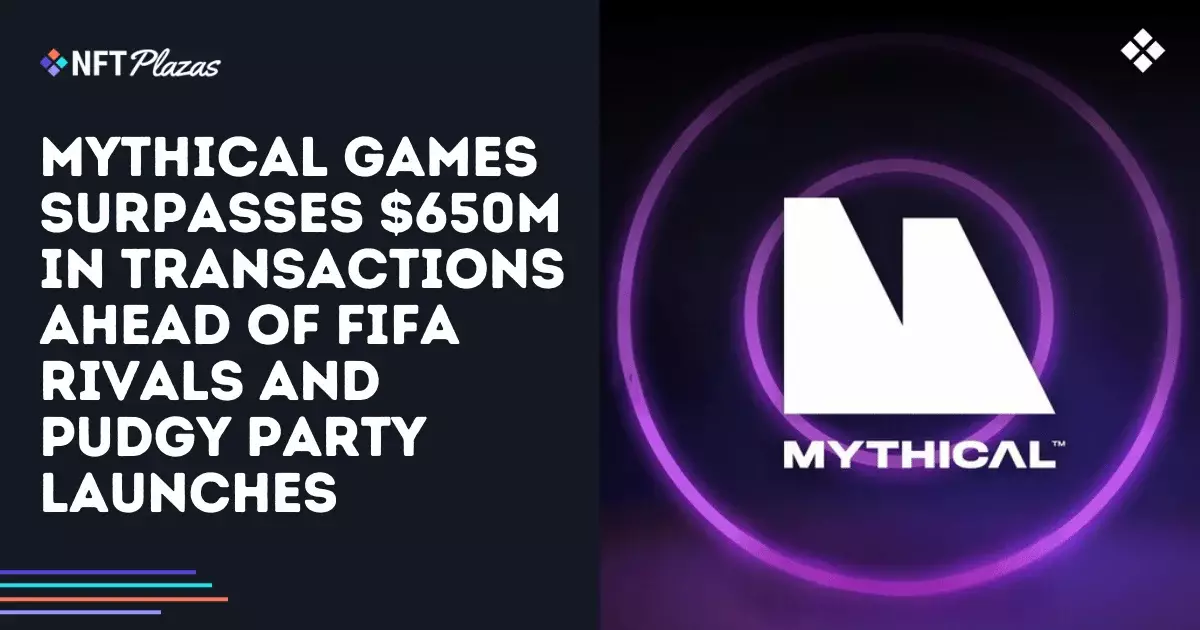In a digital landscape that is constantly evolving, Mythical Games has emerged as a beacon of innovation. Surpassing an astounding $650 million in total transaction volume, the developer has registered over 7 million players on its platform. While such figures are impressive on their face, they reflect a shift in the gaming paradigm that furthers the integration of blockchain technology into conventional gameplay experiences. As an avid supporter of the center-right ethos that encourages robust economic activity, I find this development incredibly promising. It points not only to the profitability of gaming but also to the potential for individuals to gain ownership over virtual assets.
Mythical Games, established by veterans who once stitched together titles for the likes of Activision, has placed its chips firmly on the blockchain table. They are not merely purveyors of fun; they are architects of an ecosystem that interweaves financial investment with entertainment. In a world where traditional gaming often dilutes ownership and rewards, Mythical offers a refreshing alternative: where players can collect, trade, and genuinely own their in-game assets. The upcoming launches of *FIFA Rivals* and *Pudgy Party* in 2025 signify more than just new games; they represent a culture shift that acknowledges players as stakeholders rather than merely consumers.
A Diverse Gaming Ecosystem
Mythical Games has already garnered attention with *Blankos Block Party*, *NFL Rivals*, and *Nitro Nation World Tour*. These titles aren’t standalone products; rather, they constitute a diversified ecosystem. Each game contributes to a broader narrative about the future of gaming as immersive, interactive, and economically viable. For example, *NFL Rivals* has been particularly successful, amassing over a million downloads and offering players a card-based, competitive environment that resonates with traditional sports fans while simultaneously introducing them to the innovative world of blockchain.
The backend system they’ve developed, the Mythical Platform, is a game-changer. It permits developers to integrate blockchain functionalities seamlessly into their creations without alienating users who are more accustomed to traditional gaming mechanics. This gentle onboarding approach helps demystify the complexities of cryptocurrency and blockchain, rendering them palatable for the average gamer. As a center-right thinker, I appreciate this focus on user experience, which sidesteps the often convoluted jargon associated with blockchain and instead presents it through a lens of accessibility and engagement.
Financial Backing and Strategic Partnerships
One cannot overlook the significance of heavy-hitting investors like Andreessen Horowitz, Animoca Brands, and ARK Invest backing Mythical Games. Such investment validation is not merely financial; it is an endorsement of the viability and potential longevity of blockchain gaming. The strategic partnerships and acquisitions, like the recent one with DMarket for digital asset exchange capabilities, further pigeonhole Mythical as a pioneering entity in the gaming industry. This is where I believe the center-right liberal approach shines—by fostering innovation through competitive investment and collaboration rather than through stringent regulations that might stifle creativity.
Moreover, the company’s upcoming titles promise to build on this foundation. With *FIFA Rivals* featuring arcade-style football matches and digital trading cards, and *Pudgy Party* echoing the whimsical charm of the Pudgy Penguins brand, it is clear that Mythical is not merely looking to monetize trends; they are cultivating an engaging environment for players. Their focus on social and casual gaming reflects broader cultural shifts that value community building as much as individual achievement in games.
Looking Ahead in the Gaming Landscape
As Mythical Games gears up for a global launch and a wider rollout of new titles, the implications for the future of mobile gaming are compelling. Their long-term focus on easing developers into blockchain functionality without compromising traditional gaming experiences is profound. The omission of overt promotion of crypto elements might mitigate the skepticism that often surrounds such innovations. Instead, they present a compelling case for how the integration of blockchain can enrich the overall gaming experience.
This confidence in bridging cutting-edge technology with intuitive gameplay appeals to my belief that innovation and economic freedom can thrive hand in hand. By pushing boundaries while still respecting the sensibilities of gamers, Mythical is poised not just to succeed commercially but to redefine what it means to engage in digital play. The overarching narrative is one of ownership, freedom, and diversified experiences, all grounded in a market that remains agile and responsive to the needs of its participants.


Leave a Reply